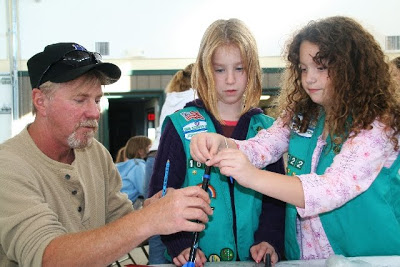Philosophy

Abstract:
When we teach physics to prospective scientists and engineers we are teaching more than the "facts" of physics- more, even, than the methods and concepts of physics. We are introducing them to a complex culture - a mode of thinking and the cultural code of behavior of a community of practicing scientists. This culture has components that are often part of our hidden curriculum: epistemology - how we decide that we know something; ontology - how we parse the observable world into categories, objects, and concepts; and discourse - how we hold a conversation in order to generate new knowledge and understanding. Underlying all of this is intuition - a culturally created sense of meaning. To explicitly identify teach our hidden curriculum we must pay attention to students' intuition and perception of physics, not just to their reasoning.
"Introducing students to the culture of physics: Explicating elements of the hidden curriculum" by Edward F. Redish
- What Is/ought To Be The Purpose Of Science Education?
I've been reading classic texts in alchemy the last few days. Interesting stuff. It's for the textbook in the history and philosophy of science that I am working on and the central idea is to have students pick the science of their interest and...
- Becky Parker...getting Kids Involved In Science
"A student research network built on a chip" June 2010 Symmetry What inspired you in physics? Was it the curriculum at school? For me it was a lecture about Mars that Carl Sagan gave at the Royal Institution; it was 1977, and he invited the audience—I...
- American Sciences/technology Status Poll
Has America lost its leading status in the sciences/technology? Yes--2 [40%] No--3 [60%] The loss of superiority in the sciences and technology is not necessarily a bad thing. Since World War II, the United States had been the front runner. But in the...
- Maybe A Secondary Education Trend?
Humm, maybe this will catch on...but, it does require other fundamental skills of mathematics, philosophy [critical thinking] and communication. "Antioch, Lakes Community highs turn science tradition upside down" by Vincent Pierri January 8th, 2009...
- Science Interests...how Is It Done?
How is it done. How does one get young people interested in the sciences: Parents, relatives, the first science set, books, television, cinema, friends, teachers, opportunities, culture, environment? Who knows. Stewart E. Brekke wrote a letter to Physics...
Philosophy
The “hidden curriculum” and the methodology of learning physics
Abstract:
When we teach physics to prospective scientists and engineers we are teaching more than the "facts" of physics- more, even, than the methods and concepts of physics. We are introducing them to a complex culture - a mode of thinking and the cultural code of behavior of a community of practicing scientists. This culture has components that are often part of our hidden curriculum: epistemology - how we decide that we know something; ontology - how we parse the observable world into categories, objects, and concepts; and discourse - how we hold a conversation in order to generate new knowledge and understanding. Underlying all of this is intuition - a culturally created sense of meaning. To explicitly identify teach our hidden curriculum we must pay attention to students' intuition and perception of physics, not just to their reasoning.
"Introducing students to the culture of physics: Explicating elements of the hidden curriculum" by Edward F. Redish
- What Is/ought To Be The Purpose Of Science Education?
I've been reading classic texts in alchemy the last few days. Interesting stuff. It's for the textbook in the history and philosophy of science that I am working on and the central idea is to have students pick the science of their interest and...
- Becky Parker...getting Kids Involved In Science
"A student research network built on a chip" June 2010 Symmetry What inspired you in physics? Was it the curriculum at school? For me it was a lecture about Mars that Carl Sagan gave at the Royal Institution; it was 1977, and he invited the audience—I...
- American Sciences/technology Status Poll
Has America lost its leading status in the sciences/technology? Yes--2 [40%] No--3 [60%] The loss of superiority in the sciences and technology is not necessarily a bad thing. Since World War II, the United States had been the front runner. But in the...
- Maybe A Secondary Education Trend?
Humm, maybe this will catch on...but, it does require other fundamental skills of mathematics, philosophy [critical thinking] and communication. "Antioch, Lakes Community highs turn science tradition upside down" by Vincent Pierri January 8th, 2009...
- Science Interests...how Is It Done?
How is it done. How does one get young people interested in the sciences: Parents, relatives, the first science set, books, television, cinema, friends, teachers, opportunities, culture, environment? Who knows. Stewart E. Brekke wrote a letter to Physics...
